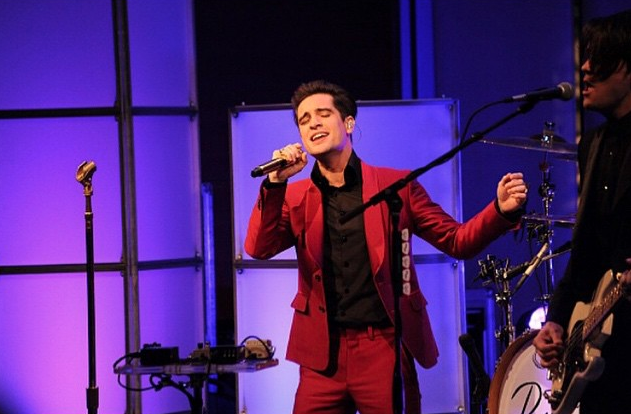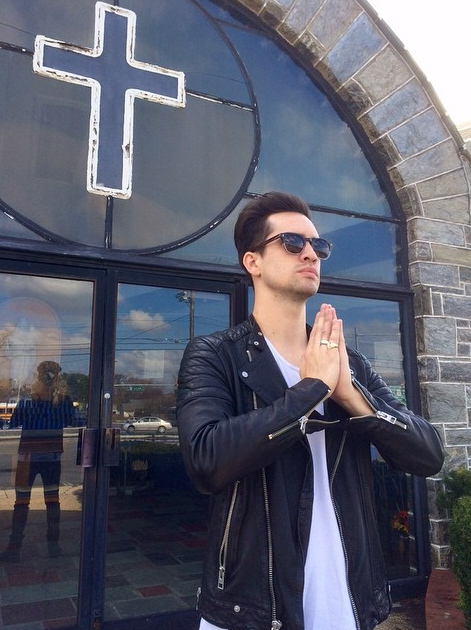What does "Emperor's New Clothes" by Panic! at the Disco mean?
SONG MEANING: "Emperor's New Clothes" by Panic! at the Disco is about winning and taking power or the "crown." It could be about Brendon Urie, the lead singer, coming back after difficult experiences with his band or relationships. Want to find out how? Keep reading! Brendon Urie's the only remaining original member (and only core member for that matter) of Panic! at the Disco, and he seems to be doing just fine. His band's Twitter page announced yesterday that they're releasing Death of a Bachelor on January 15 and to celebrate, they released the semi-Halloween-themed music video to "Emperor's New Clothes." Currently the song isn't available elsewhere--even on Spotify--but pre-orders for the album have put Death of a Bachelor easily in the top 5 ordered albums for sometime.
The Music Video
I'll be honest--it's really creepy--but in an over-the-top, corny sort of way. "Emperor's New Clothes" begins where "This Is Gospel" ends, but this time, while running into the light, Urie falls through a trapdoor down to the netherworld at the entrance to Hell. There, to a chorus of singing skulls and skeletons, he transforms into a demon until the doors to Hell open and he's ushered in.
What's going on with this video? A lot. And it all ties into the song's core meaning. "Emperor's New Clothes" is about Brendon overcoming his circumstances, but now he's revealing his true, dangerous, powerful self--the darker side of himself. The larger album may shed more light on this particular song, but for now the video suggests that he's accessing a darker side of himself to better be able to understand who he is in general. The video depicts this side as a devil who takes over once the freedom-fighting, power-to-love-desiring side of him has spent itself in the preceding clip from "This Is Gospel."
The two videos really are opposites, so it's interesting that "Emperor's New Clothes" begins where "This Is Gospel" left off. "This Is Gospel" is about fighting for the ability to love, and "Emperor's New Clothes" is about the desire for power. The videos transition at the moment when Brendon's body dies and his soul heads off into a white light. "Emperor's New Clothes" takes over as Brendon begins searching through the white light and fog, only to be dropped through a trap door down into Hell and darkness.
Looking for love in “This Is Gospel,” he finds a transformation into a symbol of evil and desire for power. [If I’m missing something, please let me know. But this fits with both “Victorious” and “Hallelujah,” his other two recent singles also about gaining victory through less than “pure” means.]
My theory is that because this video is so cartoonish, Brendon Urie could be satirizing those who see his search for victory as cutthroat by embracing the worst possible stereotype he could. He searches for victory at all costs and people think that’s wrong, so he identifies with the group “best known” for a similar attitude–demons. While the song may be sincere, he’s certainly not claiming to be in communion with the devil in this video, even if he claims to want power at what others consider an unhealthy level.
"Emperor's New Clothes" Lyrics Meaning
The core lyric of “Emperor’s New Clothes” is also the intro: “Finders keepers, losers weepers.” This is a song about power and the search for that power. In Verse 1, Brendon Urie sings, “Welcome to the end of eras / Ice has melted back to life.” Ice represents being caught in something or being stuck, but things are heating up in Urie’s song as he adds energy to his music and ideas. Because this is the “end of eras,” whatever happens next will certainly be epic and beyond what has happened before.
He’s “done [his] time and served [his] sentence,” which seems to be a reference to having lived a life in which he wasn’t the best or the “king of the world.” Either he didn’t get what he deserved, or he got exactly what he deserved–he describes himself as a sinner in “Hallelujah.” Either way, it’s his turn to come out on top (possibly referring to his hopes for the success of Death of a Bachelor).
He sings, “Dress me up and watch me die”; this is a reference to his preparation to become something else, something new, his old self dying away as his hunger for power takes over. This person will claim things that “[feel] good, [taste] good”–seeking his own pleasure and having the power to take them. His old “dynasty” is “decapitated” and listeners “might see a ghost tonight”–the ghost of his past as he moves on to what comes next.
Emperor's New Clothes - Panic! at the DiscoThe Pre-Chorus tells people that “if [they] don’t know, now [they] know” about Urie’s transformation to someone who’s not content with playing around anymore. In the Chorus, he sings that he’s “taking back the crown.” He will win and become king for a life or world that’s been trying to get him down. He’s “all dressed up and naked,” which refers to the myth mentioned in the title, that of the Emperor’s New Clothes, wherein which an emperor is tricked into walking naked through the streets in “clothes” that only a person fit for his position can see.
Urie is naked because he is becoming this new self, but this transformation is making him more transparent and easy to understand. With this new self, he sings, “I see what’s mine and take it.” The new clothes are those of a devil, but he’s more comfortable with it.
In Verse 2, Urie sings, “Sycophants on velvet sofas / Lavish mansions, vintage wine / I am so much more than royal.” His dream of taking power involves luxury and people recognizing his superiority.
I’ll be honest. The one line I really don’t get is “Snatch your chain and mace your eyes.” I’d love to hear your thoughts on this line below. My best guess is that he’s telling those who are jealous of him that he’s in charge and that they can’t even argue with him if he tells them to hurt themselves–kind of like saying, “Eat your heart out.”
He finishes the verse by singing, “Heroes always get remembered / But you know legends never die.” He plans to be more than a hero (which is reassuring somewhat because the demon in the video would make a terrible hero); he wants to be legendary and to be held in awe and reverence.
In the Bridge, he laughs at “[m]ortal kings . . . ruling castles” and welcomes the world to his “world of fun” where “liars settle into sockets.” When he flips “the switch,” they “run.” He has power in this world and wields it mercilessly. He makes the moral judgments and punishes people as he sees fit.
The song ends, “Finders keepers, losers weepers.” If Brendon can win, he will, and it’ll be tough luck for everyone else who wanted what he has. Of course, he could also lose, but based on this song, he seems confident he won’t.
My questions for you:
- What are your thoughts on “Emperor’s New Clothes” by Panic! at the Disco?
- Am I missing something? Is this maybe a deep satire?
- How does this song make you feel about Urie? Can he sing this song and still be a good person?
I look forward to your thoughts on “Emperor’s New Clothes” by Panic! at the Disco!
Clifford Stumme has his master’s in English literature and is a blogger and a college instructor/desk-watcher at Liberty University. He likes juggling and reading/writing, and he is married to the wonderful and beautiful Wife April. He thinks pop music is awesome. Seriously awesome.





